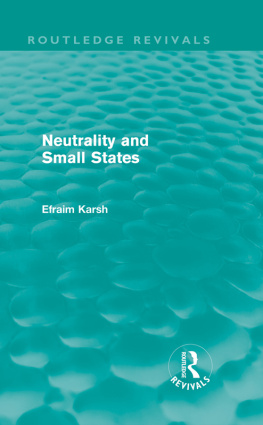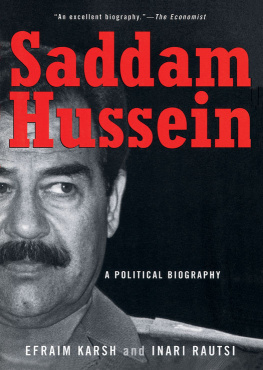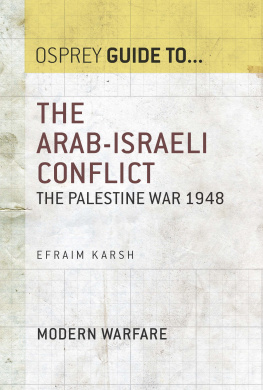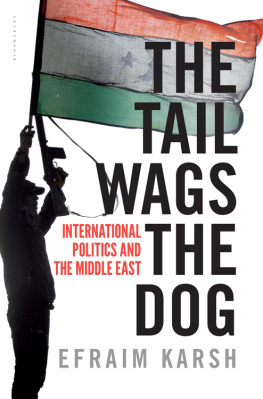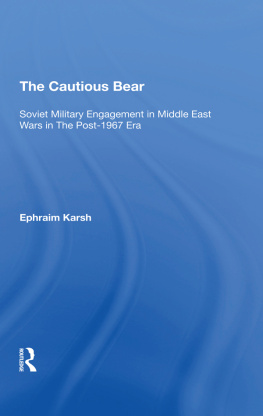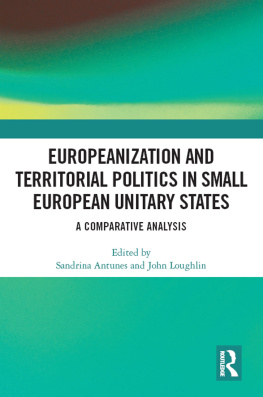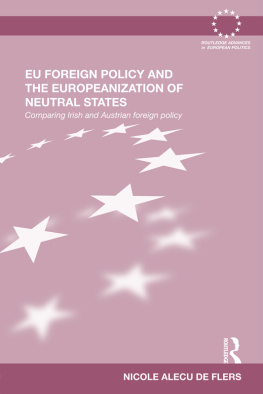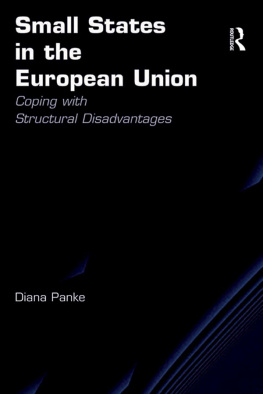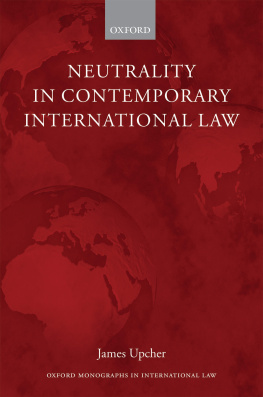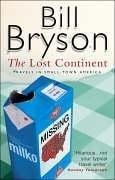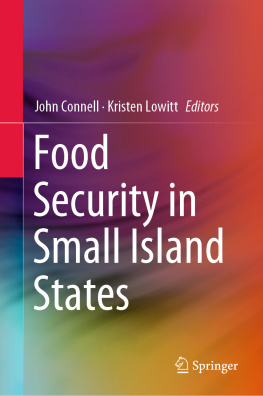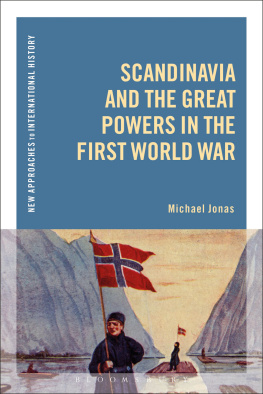Routledge Revivals
Neutrality and Small States
Originally published in 1988, this book examines the experiences of neutral states in Europe during the Second World War and in the post-war period. It examines both the practical and the theoretical considerations and the interface between the two, and discusses the implications of the experience of these countries for small states generally.
Neutrality and Small States
Efraim Karsh
First published in 1988
by Routledge
This edition first published in 2011 by Routledge
2 Park Square, Milton Park, Abingdon, Oxon, OX14 4RN
Simultaneously published in the USA and Canada
by Routledge
270 Madison Avenue, New York, NY 10016
Routledge is an imprint of the Taylor & Francis Group, an informa business
1988 Efraim Karsh
All rights reserved. No part of this book may be reprinted or reproduced or utilised in any form or by any electronic, mechanical, or other means, now known or hereafter invented, including photocopying and recording, or in any information storage or retrieval system, without permission in writing from the publishers.
Publishers Note
The publisher has gone to great lengths to ensure the quality of this reprint but points out that some imperfections in the original copies may be apparent.
Disclaimer
The publisher has made every effort to trace copyright holders and welcomes correspondence from those they have been unable to contact.
A Library of Congress record exists under LC Control Number: 89101639
ISBN 13: 978-0-415-61199-2 (hbk)
NEUTRALITY
AND
SMALL STATES
EFRAIM KARSH
First published in 1988 by
Routledge
11 New Fetter Lane, London EC4P 4EE
29 West 35th Street, New York NY 10001
1988 Efraim Karsh
All rights reserved. No part of this book may be reprinted or reproduced or utilized in any form or by any electronic, mechanical, or other means, now known or hereafter invented, including photocopying and recording, or in any information storage or retrieval system, without permission in writing from the publishers.
British Library Cataloguing in Publication Data
Karsh, Efraim
Neutrality and small states.
1. Small states. Foreign relations.
Neutrality
I. Title
ISBN 0-415-00507-8
Library of Congress Cataloging-in-Publication Data
ISBN 0-415-00507-8
For my Mother and Father,
Miriam and Moshe Karsh
Contents
Acknowledgements
In writing this book I had the pleasure and benefit of drawing on the help and counsel of many friends and colleagues. My greatest debt, both intellectually and academically, goes to Professor David Vital of Tel-Aviv and Northwestern Universities, who not only encouraged me to undertake this project and supported it in numerous ways, but has influenced my thinking in more ways than he has ever appreciated.
Some people read the manuscript or parts of it and made most useful criticism. I am particularly indebted to Dr Avi Shlaim of Oxford University, Professor A.J.R. Groom of the University of Kent, Professor Saadia Touval of Tel-Aviv University, Dr Yaacov Bar Siman-Tov of the Hebrew University of Jerusalem, Professor Ted Greenwood of Columbia University, Professor Raimo Vyrynen of the University of Helsinki and Mr Joseph Alther of Tel-Aviv University.
I spent most of the academic year 19856 in Scandinavia collecting materials and talking to people. Of all academics and government officials who generously gave me their time, I am especially thankful to Mr Max Jakobson, Professors Karl E. Birnbaum, Bengt Sundelius, Harto Hakovirta and Bertil Duner. Dr Bo Huldt, Deputy Director of the Swedish Institute of International Affairs and Mr Kari Mttl, Head of the Finnish Institute of International Affairs, most kindly offered me research facilities at their institutes, as well as their excellent contacts.
This book was prepared for publication during the summer of 1987, when I was a visiting scholar at the London School of Economics and Political Science. I would like to thank Professor Fred Halliday, Chairman of the Department of International Relations and Professor Robert Pinker, Pro-Director of the School, for making my stay possible.
Parts of the book have appeared elsewhere in a different and abridged form. A preliminary version of the discussion on Finland was published in International Affairs, vol. 62, no. 2, and in Cooperation and Conflict, vol. 21, no. 1. The analysis of the interrelationship between neutrality and international co-operation appeared in a shorter form in The Journal of Peace Research, vol. 25, no. 1. Permission for expanding this material and incorporating it into the book is gratefully acknowledged.
Last but not least, this book owes a great deal to my wife, Inari Birit, who, apart from providing me with the most conducive environment for writing it, has been my most relentless critic, improving my ideas and saving me from not a few mistakes.
Introduction
There is probably no policy so controversial, so subject to contrasting and contradictory treatment and interpretation, as neutrality. Ostensibly, a strange and inexplicable paradox. Why should neutrality, and particularly permanent neutrality, be despised by any political actor? What policy could be more desirable than that which rejects the use of physical force for the advancement of foreign policy goals? And yet, in the eyes of a state engaged in war this logic is apparently less than obvious. A state whose vital interests perhaps even whose very existence as a sovereign entity are at stake (in particular when it has been the object of aggression), cannot look with indifference, and certainly not with approval, on those seeking to escape the horrors of the same war, however lofty be the principles inscribed on their moral flag.
Indeed, history teaches that neutrality has been commonly looked upon by the belligerent parties as an immoral act, and the neutral party seen as hypocritical attempting to enjoy the best of both worlds by avoiding participation in a war while hoping to benefit from its outcome. Clearly, it is but a short step from these concepts to the precept of whoever is not with us, is against us with all its attendant ramifications for the neutral actor.
For the Italian political philosopher, Niccolo Machiavelli, neutrality is a zero sum game, whose result, from the standpoint of the neutral state, is fixed: The conqueror does not want doubtful friends who do not help him when he is in difficulties; the loser repudiates you because you were unwilling to go, arms in hand, and throw in your lot with him.1 Machiavelli was neither the first nor the last to take this view. Some thousand years before him the Prophet Muhammad, in the course of his early efforts to disseminate his new religion, encountered the same problem of neutrality: the fence-sitters, the individuals and groups who refused to join Islam and aid in the struggle to spread it, but also did not fight to oppose it. The intensity of Muhammads negative feelings towards the neutrals or, as he called them, hypocrites of his day found expression in numerous verses of the Koran that dwell on his criticism of them: Allah will afflict them with a painful doom in the world and Hereafter, and they have no protecting friend nor helper in the earth.2



